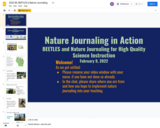
Running Slide Deck from WL BEETLES & Nature Journaling Online Sessions
- Subject:
- Environmental Literacy and Sustainability
- Material Type:
- Learning Task
- Author:
- Tiffany Lodholz
- skylar primm
- Sandy Benton
- Date Added:
- 02/09/2022

Running Slide Deck from WL BEETLES & Nature Journaling Online Sessions

The unit is a very basic introduction to phenology geared for the littlest of learners, preschool children ages 3-5. Over the course of five weeks we embrace winter fatigue and set our sights on Spring hoping to spy our very first signs of the season—we spend time looking for the first green shoots, explore the forest floor (moss, lichen and fungi), welcome back the robins, celebrate the spring beauties, embark on a frog hunt and observe the dancing dragonflies!Week One—On the hunt for greenWeek Two—Beneath our feet…Week Three—Birds!Week Four—Spring ephemerals and awakening bugsWeek Five—Pond StudyPrior to introducing phenology to my students and implementing this unit, we had been using simple journal prompts at the end of each week as an assessment tool. My students are primarily in the pre-writing stages—the bulk of our entries are fantastic imaginative crayon sketches that we have each student describe for us. I am incredibly fortunate to teach in a garden-based program where we are outside for the majority of our learning time together and teachable moments abound. For this unit, I really wanted our Sprouts to take a closer look at the things we see every day.

This resource will allow you to teach the concept of Farm to Table to your students as well as providing them with the understanding of the agricultural industry and how it connects us all together, and how it plays a role in their everyday lives.

This unit begins and ends with the motivating reality that my fifth graders are responsible forthe raspberry patch on our school grounds. Since they are responsible for maintaining,harvesting, and caring for this patch in general, it is a logical connection that they should beknowledgeable about it. In the end, it is a true learning-by-doing experience. It should benoted that this is an ongoing recurring type of unit that we come back to with variousexperiences throughout the school year.

Authors: Tiffany Lodholz, Morgan May, Jenny GrimesSchool: High Marq Environmental Charter School, Montello School DistrictUnit Title: Garden MathGrade Level: 7-12Content Area(s): Environmental Science, MathematicsContext:High Marq Environmental Charter School is a project and place based school that serves grades 7-12 in Marquette County, Wisconsin. Each week our students participate in a full day field experience designed to connect, explore and engage with the outdoors. These five lessons were all a part of those experiences. Our focus this year was on gardening. All of these lessons took place in the school garden on campus, Our school district has a greenhouse for us to start seeds in and our garden uses primarily raised beds. The students also traveled to a local greenhouse to purchase supplemental plants, soil, mulch, hay, and other accessories.
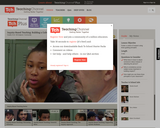
Building a culture of respect while still challenging students to share their voices requires thoughtful and careful facilitation by the teacher. Urban Academy teachers discuss the roles they play across subject areas to develop this respect in their school and how consistency across disciplines helps to establish respect among students. Three guiding principles come out of the teachers' reflection that foster a culture of respect. Teachers do not allow personal attacks, asking students to instead 'attack' ideas instead of people. In facilitating discussions, teachers avoid questions with 'right/wrong' answers, recognizing the value of all students' responses, and arbitrate fairly so that students trust teachers to manage sometimes controversial subjects fairly.
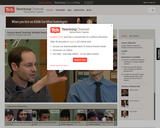
In an effort to promote deeper analysis and understanding of multiple viewpoints, Urban Academy teachers discuss the conscious decisions they make to promote this type of discussion. The group reflects on how they structure discussions to highlight different perspectives and also rephrase and restate student comments to heighten differences in opinions and to draw out additional responses. In reacting and responding to these differences, students participate in a deeper analysis.
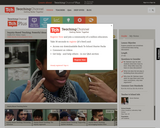
Using an inquiry based approach has a profound effect on the depth and complexity of classroom discussions. In this video, students share how this is different than what they've previously experienced and we see teacher, Avram Barlowe, use primary source documents to drive discussions about freedom as it existed during Reconstruction following the Civil War. Recognizing that these documents describe both daily life and larger political and social ideas, Avram expects that the discussion will focus on both elements but will be largely driven by student comments and reactions to each text. In preparation for this inquiry based approach, Avram shares how he develops many questions that may never be used and must be ready to use students' comments and questions to facilitate the resulting discussion. Even though he knows ahead of time that there are specific issues that should be explored, he does not come into the discussion with specific answers or outcome for these issues. Avram sees the text as a vehicle in which the students can explore ideas that interest them and requires that students use multiple documents to challenge their thinking and extend their understanding of differing perspectives. In this way, students are prepared to not only discuss these ideas in this informal setting but are also prepared to read analytically and write about these ideas, considering multiple perspectives.
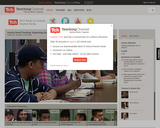
Supporting participation from all students is a challenging part of every teacher's practice. Discussing the different ways in which they support and encourage quieter students, Urban Academy teachers share ideas and reflect on the different ways in which students participate in learning. They recognize that different students participate in different ways and at different times but also make conscious decisions to support those who are not actively sharing ideas with the class. We see this happen with one student, Ebony, who was reluctant to share ideas but gains confidence through one-on-one coaching with her teacher, Sheila Kosoff. To support building this confidence, teachers discuss planning discussions outside of class and organizing smaller group discussions before bringing the whole class together.
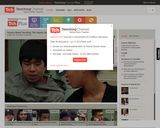
Four teachers at Urban Academy Laboratory High School talk about how they use the inquiry approach in their teaching. History teacher Adam Grumbach talks about how using the inquiry model is a helpful strategy for teaching students of mixed abilities while History teacher Avram Barlowe discusses how the inquiry model is enriched by diverse participants. As students are shown having an inquiry-based discussion, we see evidence of different points of view and the importance of having these discussions in the context of the classroom. Adam shares the significance of having discussions with students from diverse backgrounds and diverse viewpoints and points out that this has as much educational value as more traditional learning opportunities. At the close of the video, four components of the inquiry approach are identified: it promotes a diversity of voices, it creates opportunities for students to share opinions, it teaches students how to use evidence and builds students' confidence.
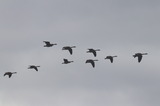
This series of 5 high-quality, standards-aligned, inquiry-based activities and two environmental STEM challenge activities have been field-tested by kindergarten students and families of Wequiock Children's Center for Environmental Science during Safer At Home orders. These activities encourage students to use natural areas around their homes and in their neigbhorhoods as they improve their science observation and reasoning skils as they explore the science of pushes and pulls in nature. The materials used are ones generally available at home and the activites require little preparation on the part of caregivers. Created as a part of a WISELearn OER Innovation project, Connect, Explore, and Engage: Using the Environment as the Context for Science Learning was a collaboration of the Wequiock Children's Center for Environmental Science and the Wisconsin Green Schools Network. One of the goals of the project was to create standards-aligned lessons that utilize the outdoor spaces of the school (as well as those of the students' homes). Each section of this resource is an individual activity. While each activity builds on the previous ones, it is possible to use them individually.The title image was used with permission and is courtesy of Joe Riederer.
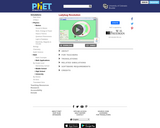
Join the ladybug in an exploration of rotational motion. Rotate the merry-go-round to change its angle, or choose a constant angular velocity or angular acceleration. Explore how circular motion relates to the bug's x,y position, velocity, and acceleration using vectors or graphs.
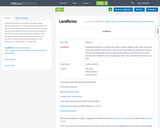
Students will use hands-on models, maps, and the natural landscape to describe landforms in our area and and develop and understanding of the effects of water and wind on these landforms. Prior to these lessons, students will have had experiences with the use of "I Notice, I Wonder, It Reminds Me Of" protocols as well as field journaling. This is a unit for second grade landforms that culminates in a visit to Roche-A-Cri State Park.

Maple Grove Charter School, Athens School District, is a Grades K-5 elementary school located the heart of the rural Town of Hamburg. The school takes its name from the school forest on its site. Built in 1904, the school has annual tradition of tapping the maple trees. What started as a first grade classroom project has expanded as students from each grade level identify, tap, and collect sap from two trees. Unit plans have been created for each grade level to address agriculture, science, literacy, social studies, math, and environmental literacy standards. While the sap collecing routines remain relevatively constant each year, the learning opportunties have been differentiated by grade level so that students are always learning new content and skills.In the following unit plan discussion readers will learn about the schoolwide project from the perspective of teachers in Grades 1 and 5.Students in Grade 1 learn about maple tree identification and the traditional and modern tools and technologies employed in sap collection and syrup production. Their fifth grade counterparts continue to grow in their understanding of the tapping, collection, and production processes, and take on the role of entrepreneurs as they develop their brand and market the finished pure maple syrup.

Author: Ned Dorff, Teacher, Aldo Leopold Community School, Green Bay Area Public SchoolsUnit Title: Nature Journaling Indoors and Outdoors for the Primary GradesGrade Level: 1st and 2nd gradeContent Area(s): Writing, ScienceStudents learned how to nature journal in the classroom during the late winter and then used our skills to head out into our neighborhood for outdoor journaling experiences. With the aid of an eagle cam, we were able to explore science concepts of life cycles over the period of several months. Our practice indoors also allowed us to transfer knowledge to what we were seeing outside.

Content Area(s):Environmental LiteracyWisconsin Standards for Environmental Literacy and Sustainability Addressed: ELS.C1: Students develop and connect with their sense of place and well-being through observation, exploration, and questioning.Context: Individual children participated in observing nature outside the public library (or online or natural exhibits inside the library). Observation Experiences:1) Daffodils2) Painted Lady Caterpillars and Butterflies3) Tree frogs4) Mosquitoes5) One Square Foot Observations

Unit Title: Near Nature Exploration Developed by Tiffany Lodholz, High Marq Environmental Charter School Grade Level:6-12 Content Area(s): Environmental Science, Science, ELAOver the course of a semester students in grades 6-12 engaged in various nature journaling activities that allowed them to connect, explore, and engage with the environment around them. Students participated in monthly phenological observations, discovered ways to use nature journaling for scientific study, and developed new techniques for looking closer and making deeper, more meaningful observations.A series of five outdoor nature journaling lessons are described:Qualitative PhenologyNature JournalingSAUNTERBug RadnessFrog Fest!
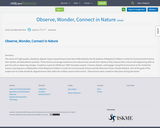
This series of 5 high-quality, standards-aligned, inquiry-based lessons have been field-tested by the 4K students of Wequiock Children's Center for Environmental Science, their teacher and educational assistant. These lessons encourage students to use natural areas around their school as they improve their science and engineering skills as part of a unit on observing changes. Created as a part of a WISELearn OER Innovation project, Connect, Explore, and Engage: Using the Environment as the Context for Science Learning was a collaboration of the Wequiock Children's Center for Environmental Science and the Wisconsin Green Schools Network. One of the goals of the project was to create standards-aligned lessons that utilize the outdoor spaces of the school . These lessons were created to take place during late winter.
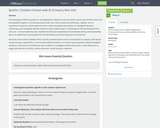
The following six OERS for grades K-5 are designed for teachers to use the outdoor spaces around their schools for learning with the goals of connecting students with their sense of place and well-being. Together, the six experiences comprise a school-wide mini-unit in which each grade level explore an Investigative Question. Collectively, each Investigative Question leads the entire student body in considering the Essential Question of the mini-unit. A school leadership team identified the Wisconsin Standards for Environmental Literacy and Sustainability (ELS) to be addressed at every grade level and developed an Essential Question to be explored.Wisconsin Green Schools Network FIELD coaches provided teachers with an introduction to outdoor, place-based inquiry learning, unpacked ELS, and met with grade level teams to co-create inquiry questions (called Investigative Questions in the lessons that follow) for their students to investigate outside each quarter. These OERs were co-taught with teachers and FIELD coaches and were refined during co-reflection.
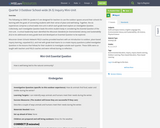
The following six OERS for grades K-5 are designed for teachers to use the outdoor spaces around their schools for learning with the goals of connecting students with their sense of place and well-being. Together, the six experiences comprise a school-wide mini-unit in which each grade level explore an Investigative Question. Collectively, each Investigative Question leads the entire student body in considering the Essential Question of the mini-unit. A school leadership team identified the Wisconsin Standards for Environmental Literacy and Sustainability (ELS) to be addressed at every grade level and developed an Essential Question to be explored.Wisconsin Green Schools Network FIELD coaches provided teachers with an introduction to outdoor, place-based inquiry learning, unpacked ELS, and met with grade level teams to co-create inquiry questions (called Investigative Questions in the lessons that follow) for their students to investigate outside each quarter. These OERs were co-taught with teachers and FIELD coaches and were refined during co-reflection.